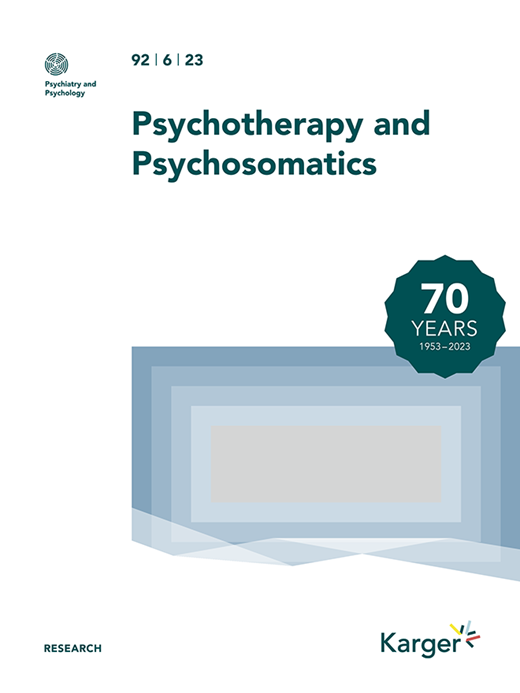Long-Term Effects of Cognitive Behavioral Therapy on Sickness Absence and Cognitive Functioning in Patients with Stress-Related Disorders: Secondary Results from a Randomized Clinical Trial.
IF 17.4
1区 医学
Q1 PSYCHIATRY
引用次数: 0
Abstract
Introduction Stress-related disorders, including adjustment disorder and exhaustion disorder, are associated with cognitive complaints and prolonged sickness absence (SA). This study evaluated the effects of cognitive behavioral therapy (CBT) compared with an active control treatment (entitled General Health Promotion; GHP) on these outcomes and examined the association between cognitive impairment and SA. Methods In this randomized clinical trial, 300 participants were randomized to CBT or GHP. SA data from the Swedish Social Insurance register were collected from one year before to one year after treatment. Cognitive functioning, assessed via a validated test battery, was measured at baseline, posttreatment, and one-year follow-up (1YFU). Hurdle negative binomial models evaluated SA and linear mixed-effects models analyzed cognitive outcomes. Results CBT and GHP had comparable effects on SA and cognitive functioning with no significant between-group effects (all p > .05). Analyzing effects across the entire sample, the number of SA days among those with any SA did not significantly change (p = .946) but the likelihood of having any SA decreased significantly by the 1YFU (OR = .92, 95% CI [.87, .96], p < .001). Independent of treatment group, overall cognitive functioning improved both posttreatment (d = -.42, 95% CI [-.6, -.25], p < .001) and at 1YFU (d = -.72, 95% CI [-.91, -.54], p < .001). Improvements in cognitive functioning pre to posttreatment were associated with fewer SA days at the 1YFU (IRR = .54, 95% CI [.33, .87], p = .01). Conclusion This study found no specific effect of CBT on SA or cognitive functioning for individuals with stress-related disorders. Cognitive functioning improved regardless of treatment. Early support before SA initiation is likely important to prevent long-term SA.认知行为疗法对应激相关疾病患者缺勤和认知功能的长期影响:一项随机临床试验的次要结果
压力相关障碍,包括适应障碍和疲劳障碍,与认知疾病和长期缺勤(SA)有关。本研究评估了认知行为疗法(CBT)与积极对照治疗(一般健康促进;GHP)对这些结果进行了研究,并研究了认知障碍与SA之间的关系。方法在这项随机临床试验中,300名参与者被随机分为CBT组和GHP组。来自瑞典社会保险登记的SA数据从治疗前一年到治疗后一年收集。在基线、治疗后和1年随访(1YFU)时,通过一组有效的测试来评估认知功能。障碍负二项模型评估SA,线性混合效应模型分析认知结果。结果CBT和GHP对SA和认知功能的影响相当,组间无显著差异(p < 0.05)。分析整个样本的影响,有任何SA的人的SA天数没有显着变化(p = 0.946),但有任何SA的可能性显着降低了1YFU (OR = 0.92, 95% CI)。87, .96], p < .001)。与治疗组独立,治疗后整体认知功能改善(d = -。42, 95% ci[-]。6日-。[25], p < .001)和1YFU (d = -。72, 95% ci[-]。91年-。[54], p < 0.001)。治疗前后认知功能的改善与1YFU时SA天数的减少相关(IRR = 0.54, 95% CI)。33, .87], p = .01)。结论:本研究未发现CBT对应激相关障碍患者的SA或认知功能有特异性影响。无论治疗方式如何,认知功能都有所改善。SA开始前的早期支持可能对预防长期SA很重要。
本文章由计算机程序翻译,如有差异,请以英文原文为准。
求助全文
约1分钟内获得全文
求助全文
来源期刊

Psychotherapy and Psychosomatics
医学-精神病学
CiteScore
29.40
自引率
6.10%
发文量
46
期刊介绍:
Psychotherapy and Psychosomatics is a reputable journal that has been published since 1953. Over the years, it has gained recognition for its independence, originality, and methodological rigor. The journal has been at the forefront of research in psychosomatic medicine, psychotherapy research, and psychopharmacology, and has contributed to the development of new lines of research in these areas. It is now ranked among the world's most cited journals in the field.
As the official journal of the International College of Psychosomatic Medicine and the World Federation for Psychotherapy, Psychotherapy and Psychosomatics serves as a platform for discussing current and controversial issues and showcasing innovations in assessment and treatment. It offers a unique forum for cutting-edge thinking at the intersection of medical and behavioral sciences, catering to both practicing clinicians and researchers.
The journal is indexed in various databases and platforms such as PubMed, MEDLINE, Web of Science, Science Citation Index, Social Sciences Citation Index, Science Citation Index Expanded, BIOSIS Previews, Google Scholar, Academic Search, and Health Research Premium Collection, among others.
 求助内容:
求助内容: 应助结果提醒方式:
应助结果提醒方式:


